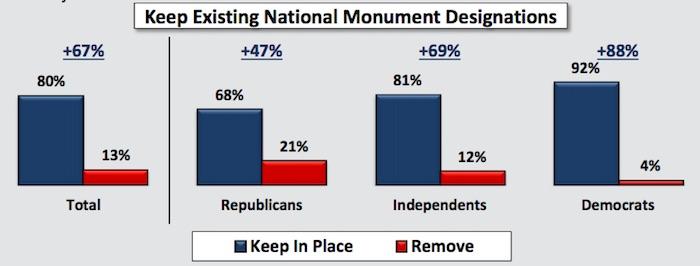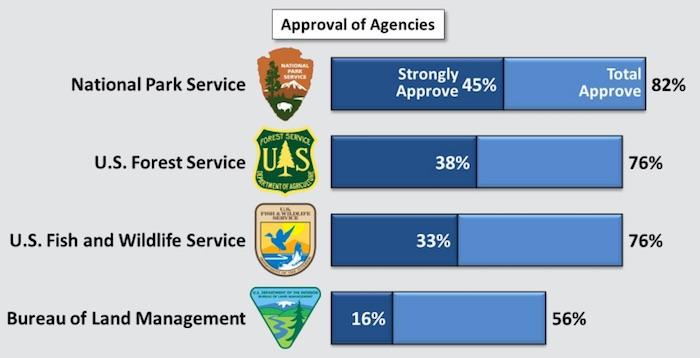
Polling in seven Western states shows a strong majority of voters value clean air and water and outdoor recreation above energy development on public lands. And while the results showed eight in 10 voters want to retain, not decommission, national monuments, Utah officials were working to ask the Trump administration to do just that.
Colorado College has been polling Western views for seven years, and the latest poll released Tuesday indicates strong support for repairing national park infrastructure, improving access to public lands for hunting, fishing and hiking, and promoting the outdoor economy. Conversely, just one-third of the respondents supported more coal mining on federal lands and allowing oil and gas companies to "purchase the right to drill in new areas of national public lands."
But in light of November's election results and increased disparaging of news and news organizations that people don't agree with, what impact will the poll have? Will its findings be considered accurate or a spin? The rise of "fake news," fanned by the Trump administration and embraced by many of its followers, is keeping fact checkers working overtime while also eroding the credibility of the Fourth Estate, which long has valued itself as being impartial and serving an invaluable role in terms of providing transparency and accountability.

The polling by Colorado College, at least outwardly, seems to have had little if any effect on some politicians.
For example, the poll's numbers indicate that 42 percent of those surveyed in Utah said they believe national monument designations should be retained, and 48 percent thought designation of the 1.35-million-acre Bears Ears National Monument was either somewhat or strongly “more of a good thing” for the state of Utah. But Republicans in the Utah Legislature were pushing through resolutions asking the Trump administration to both overturn President Obama's designation of Bears Ears in southeastern Utah and reduce the size of the Grand Staircase-Escalante National Monument in southern Utah that President Clinton designated in 1996. The Grand Staircase resolution didn't cite a specific acreage reduction, other than calling for the monument to be reduced in size to "the minimum area necessary to protect antiquities" identified by President Clinton.
At the same time, U.S. Rep. Rob Bishop, a Utah Republican who oversees the House Natural Resources Committee, seems not to have seen any of the polls; he has been a vocal opponent of not just the Bears Ears National Monument but the Antiquities Act that gives presidents the authority to designate national monuments. Lee Lonsberry, Rep. Bishop's press secretary, did not immediately respond Tuesday to an email seeking information on how the latest polling might affect Mr. Bishop's positions on those areas.
In surveying 400 registered voters in each of seven Western states -- Arizona, Colorado, Montana, New Mexico, Nevada, Utah, and Wyoming -- in late December and early January, the poll found that:
- 94 percent of the respondents said they want the Trump administration to repair infrastructure in national parks and other outdoor destinations
- 80 percent favor more wind and solar projects on public lands
- 82 percent want improved access to public lands for hunters, anglers, and hikers
- 68 percent of respondents prefer protecting water, air, and wildlife while providing opportunities to visit and recreate on national public lands
- 79 percent want more promotion of the outdoor economy
- 22 percent said they prefer the Trump administration place an emphasis on producing more domestic energy by increasing the amount of national public lands available for responsible drilling and mining
Asked what the Trump Administration should emphasize, 68 percent of respondents said they prefer protecting water, air, and wildlife while providing opportunities to visit and recreate on national public lands. That compared to 22 percent of respondents who said they prefer the administration place an emphasis on producing more domestic energy by increasing the amount of national public lands available for responsible drilling and mining.
Montana Gov. Steve Bullock, who sat in briefly Tuesday on a conference call to go over the poll's results, said the West's public lands are good for business and he opposes any moves to shrink or sully them.
"I hear from Montana companies that Montana’s public lands are a competitive advantage in attracting talent. Employees and employers alike want to live and work close to where they can play," he said. "I look at my outdoor economy, that’s 64,000 jobs, $6 billion in direct consumer spending each and every year. I’m committed to this state being a leader on public lands and the outdoor recreation economy. It’s why we’ve been working on creating the Office of Outdoor Recreation. It’s why we actually created a public access specialist to help unlock some of those acres that we can’t get to. And it’s why we’re working to really harness those outdoor public lands to help build that 21st century economy for our state.”
The Democrat also said that, “(T)hose of us in the West will be watching carefully to ensure that the new administration really does uphold its promise to follow in the footsteps of Theodore Roosevelt, who was America’s great public lands president.”

Dr. Walt Hecox, professor emeritus of economics at Colorado College and founder of the State of the Rockies Project that produces the polling, was optimistic that the polls are having an impact.
"It’s not just a flash in the pan. And a variety of groups on all sides have picked it up and now value learning what people are thinking in the Rockies," he said. “I think we need to step back a little bit from the almost-hysteria of events coming at us so quickly in the first few weeks of the new administration and a new Congress. These issues will work their way through Congress. They’re a variety of people who will buy into what Rep. Bishop supports and those who will not. In the end, having this kind of data about what people in the Rockies really think and value, is invaluable. It’s critical that we be able to represent in a politically neutral way what all sides of the issue are thinking, and that’s exactly what this does.”
At the National Wildlife Federation, Aaron Kindle, the organization's Western sportsmen’s campaign manager, said there would be a lot of opposition if the Trump administration tried to sell off or mar public lands in the West.
“The results of the new Colorado College poll showing broad, bipartisan support among Western voters for keeping public lands public and responsible energy development certainly reflect the wide support we see among hunters, anglers, rafters, and wildlife watchers, regardless of political party. Sportsmen in the West and across the country are united in our passion for our American outdoor heritage and proponents of selling it off, carving it up or giving it away should take heed," he said.
Evidence of that coalition's impact, said Mr. Kindle, can be found in past efforts by sportsmen, outdoor recreation enthusiasts, and conservationists to band together to "defeat dozens of attempts at the state and federal levels the last few years to sell or get rid of public lands. We’re going to keep working and we’re confident the majority of Americans are with us. We’re also optimistic that Ryan Zinke, if confirmed to head the Interior Department, will follow through on his commitments to keep public lands public, expand access to public lands for sportsmen, and promote funding for fish and wildlife habitat.”




Comments
Beachguy: Neither the left nor the right "own" fake news exclusively. In my view, fake news is something knowingly false which is intended to deliberately mislead people. I don't think your 6 examples are representative of this.
Yawn. We all know the only thing that really counts in Washington now are those TV ratings.
Truth? Why bother?
A few alternative facts do a great job of driving them up.
I wonder how long it will be before some people begin to ask, "My God, what have we done?" I also wonder if they will find the honesty needed to admit they made a YUGE mistake?
Traveler, thank you for an informative and interesting post.
Not only realize it, Lee, but have the brass and the wherewithal to do something about it.
Kurt - I'm curious why FWS is so low. Is it mostly disgruntled hunters and fishermen? I always thought of them as a very benign resource protector.
Rick B.
The refuge system is only 1 of 6 or 7 parts of what FWS does. They also do endangered species act listings and section 10 permitting, and substantial numbers of citizens are opposed to letting a tiny fish or slow bird stand in the way of what they want to do with public lands & waters.
Thanks, tomp2. That makes sense. Can't let a snail darter or an old growth forest stand in the way of development.